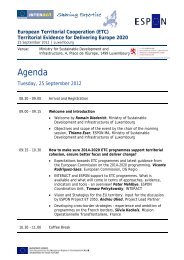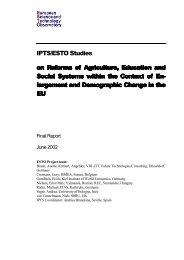Achievements of Europe's regional policy 2004-2009 - Et2050.eu
Achievements of Europe's regional policy 2004-2009 - Et2050.eu
Achievements of Europe's regional policy 2004-2009 - Et2050.eu
Create successful ePaper yourself
Turn your PDF publications into a flip-book with our unique Google optimized e-Paper software.
<strong>2004</strong>-<strong>2009</strong> Report<br />
• The EU has reinforced the urban dimension <strong>of</strong> the EU <strong>regional</strong> <strong>policy</strong> by including it<br />
into the main programmes and by widening the geographical coverage <strong>of</strong> the<br />
URBACT programme. Approximately 3% equalling €10 billion <strong>of</strong> the European<br />
Regional Development Fund (ERDF) has been programmed explicitly for urban<br />
development. However, the total share, when all potential actions are included, can be<br />
expected to be significantly higher.<br />
vi) Developing <strong>Europe's</strong> strategy for the Outermost Regions<br />
• A particular condition for greater territorial cohesion, and a priority for the Union as a<br />
whole, is to ensure that the opportunities <strong>of</strong> the single market are extended to its most<br />
distant regions, the seven outermost regions (Azores, Madeira, the four French<br />
overseas departments and the Canary Islands). The period between <strong>2004</strong> and <strong>2009</strong> has<br />
seen considerable efforts by the Commission to push <strong>policy</strong> forward in this field,<br />
reaffirming the importance it attaches to the future <strong>of</strong> these regions.<br />
• The strategy conceived and implemented by the Commission since <strong>2004</strong> has been kept<br />
under review. It was updated in 2007 which also marked the launch <strong>of</strong> a public<br />
consultation on future <strong>policy</strong>. Following-up the consultation, in 2008, the Commission<br />
published a new report laying the basis for a renewed strategy. The central proposal is<br />
to seek to emphasise in future <strong>policy</strong> the contribution the outermost regions can make<br />
to the Union in many fields, including in our understanding <strong>of</strong> climate change<br />
processes, and <strong>of</strong> the environment and bio-diversity, and helping develop relations<br />
with surrounding countries given their unique geographical position.<br />
• Commissioner Hübner has attached particular importance to developing a close<br />
partnership with the regions themselves, for example, through the Annual Conferences<br />
<strong>of</strong> the Presidents, thus giving a strong signal <strong>of</strong> the importance <strong>of</strong> the specific support<br />
measures for the outermost regions within Community policies.<br />
vii) Responding to natural disasters through the Solidarity Fund<br />
• Developed on the initiative <strong>of</strong> the Commission in 2002, the EU Solidarity Fund grants<br />
aid to Member States and acceding countries in the event <strong>of</strong> a major natural disaster.<br />
As such, it is one <strong>of</strong> the most concrete demonstrations <strong>of</strong> solidarity between Member<br />
States in acute times <strong>of</strong> need.<br />
• Between <strong>2004</strong> and <strong>2009</strong>, the Fund intervened 34 times in 18 Member States,<br />
representing a total allocation for emergency measures <strong>of</strong> €700 million. These figures<br />
give a clear indication <strong>of</strong> the importance, and the need, <strong>of</strong> this Fund.<br />
• In 2005, the Commission presented a proposal to the European Parliament and to the<br />
Member States to revise the Solidarity Fund regulation in order to enlarge its scope,<br />
simplify its use and reduce the time between the applications from a Member State<br />
and the allocation <strong>of</strong> the aid. In particular, the Commission proposed that the<br />
Solidarity Fund should cover disasters other than those arising from natural<br />
catastrophes (industrial/technological disasters, public health emergencies and acts <strong>of</strong><br />
terrorism).<br />
• However, despite a largely favourable vote <strong>of</strong> the European Parliament, the proposal is<br />
still on the table in the Council. The Commission remains convinced that a revision <strong>of</strong><br />
the regulation is necessary to improve its functioning. Therefore it will adopt a report<br />
21







